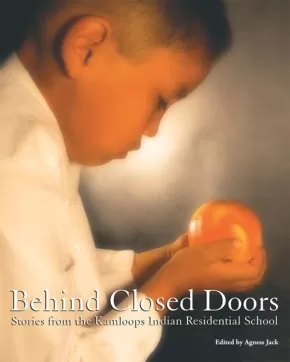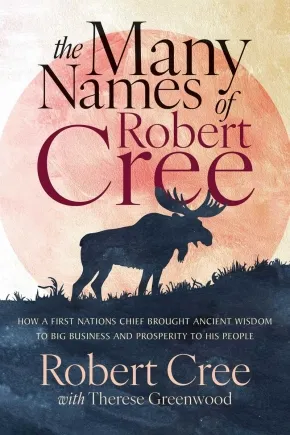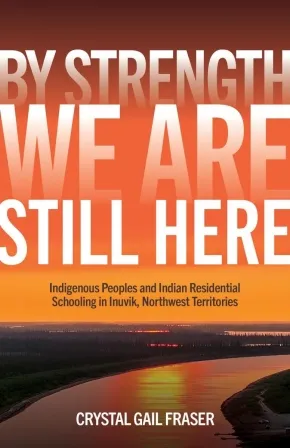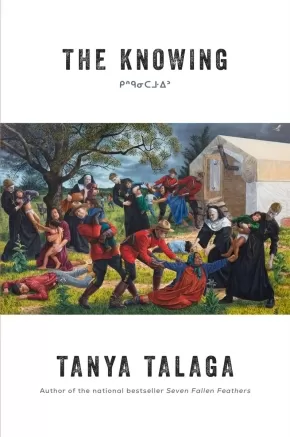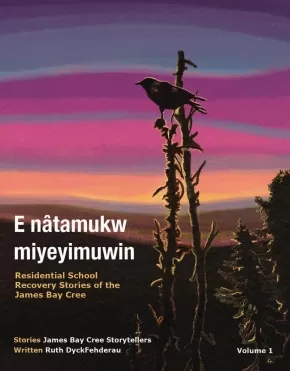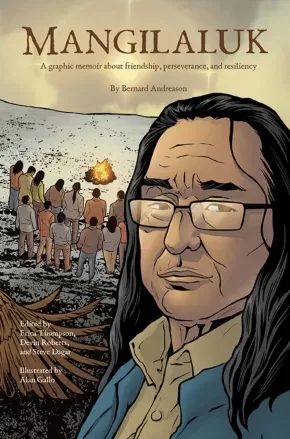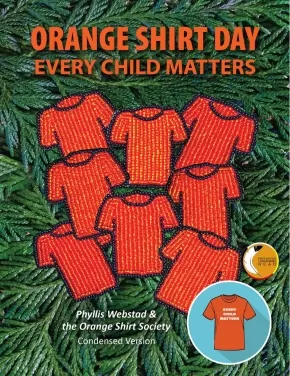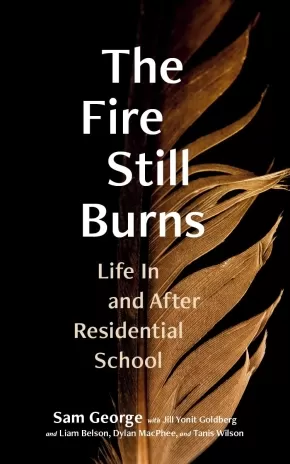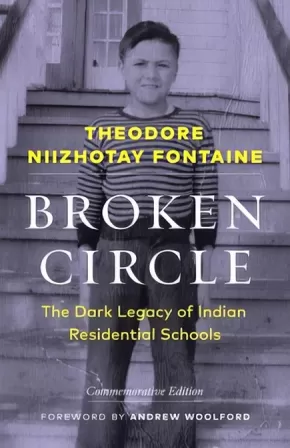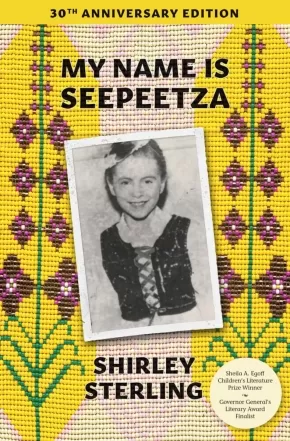
Residential Schools
1
-
15
of
40 Results;
Sort By
Go To
of 3
Behind Closed Doors: Stories from the Kamloops Indian Residential School
$32.95
Editors:
Format:
Paperback
Text Content Territories:
Indigenous Canadian;
ISBN / Barcode: 9781926886770
Synopsis:
Synopsis:
Behind Closed Doors features written testimonials from thirty-two individuals who attended the Kamloops Indian Residential School. The school was one of many infamous residential schools that operated from 1893 to 1979. These storytellers give voice to the thousands as they remember and share with us their stolen time at the school; many stories are told through courageous tears.
Additional Information
202 pages | 11.50" x 8.00" | Paperback
Gino: The Fighting Spirit of Gino Odjick
$36.00
Format:
Hardcover
Text Content Territories:
Indigenous Canadian; First Nations; Anishinaabeg; Algonquin; Kitigan Zibi Anishinabeg;
Reading Level: N/A
ISBN / Barcode: 9781778402708
Synopsis:
Synopsis:
From veteran hockey reporter Patrick Johnston and Gino’s longtime friend Peter Leech comes the authorized biography of Gino Odjick.
In the 1980s and ’90s, National Hockey League games were very different from the nimble, skill-focused displays we see today. One of the greatest differences—and one of the sport’s more popular facets at the time—was the widespread presence of “enforcers”: hulking, battle-scarred players whose main task was to police the sport by chasing down and brawling with opponents who had broken unwritten codes determining which aspects of violence counted as dishonorable or unjustified.
When hard-hitting Vancouver Canucks player Gino Odjick emerged in the early 1990s, he quickly became one of the game’s most feared enforcers and revered teammates, a sign of a new era for the team, racking up 296 penalty minutes in the 45 games he played in his rookie season. Hailing from Kitigan Zibi, an Algonquin community near Maniwaki, Quebec, Gino was one of the few Indigenous players in the NHL at the time. But it was Gino’s ferocious play contrasted by his genuinely affable and openhearted personality off the ice that won him a special place in the hearts of Canucks supporters.
Yet legends often obscure the human stories behind them. Patrick Johnston and Peter Leech look beyond Gino’s legendary persona, drawing on insights from family members, friends, and teammates to recount Gino’s early years in a loving household that was always ready to welcome foster children. Gino’s father, Joe, had suffered the lonely traumas of the residential school system, and the experience had instilled a commitment in the family to those who were less fortunate.
The book also details Gino’s eventual struggles with alcohol abuse, and how he responded by taking on the role of empathetic mentor to young Indigenous people, travelling from community to community to hear their stories and offer hope. He never wavered in this role, even as he confronted serious illnesses, including chronic traumatic encephalopathy (CTE) and the rare blood disorder that he survived for years longer than expected, but that eventually led to his death at age fifty-two.
Gino is a moving tribute to a beloved hockey legend.
Reviews
"Gino was the greatest teammate; he had such a huge heart and knew his role better than anyone in the league. Gino loved being a Vancouver Canuck and gave back to the community in so many ways. He will be greatly missed by his family, friends, and fans. This book will give people insight into his remarkable life."—Geoff Courtnall
“Gino provides a compelling account of the life of a beloved Vancouver Canuck. From his humble beginnings in Quebec to NHL stardom and beyond, Odjick was dedicated to the well-being of teammates and the Indigenous community. This is an excellent tribute to an exceptional man.”—Randi Druzin, author of Between the Pipes and Behind the Mask
Additional Information
288 pages | 6.00" x 9.00" | b&w insert | Hardcover
The Many Names of Robert Cree: How a First Nations Chief Brought Ancient Wisdom to Big Business and Prosperity to His People
$26.95
Format:
Paperback
Reading Level: N/A
ISBN / Barcode: 9781770418301
Synopsis:
Synopsis:
A vital account of the life and many names of Robert Cree, and his plan for a peaceful, sincere, and just path to reconciliation in an angry and chaotic world.
His mother called him “Bobby Mountain.” Elders called him “Great Man.” His people called him “Chief.” Oil men called him “Mr. Cree.” But the government called him “Number 53.” Robert Cree was all of these while facing his people’s oppressors and freeing the ghosts of tortured spirits.
The Many Names of Robert Cree is his first-person account of survival in a brutally racist residential school system designed to erase traditional Indigenous culture, language, and knowledge. It is also the story of an epic life of struggle and healing, as Cree takes the wisdom of his ancestors and a message of reconciliation to the halls of government and to industry boardrooms.
In the storytelling tradition of his people, Cree recounts his early years in the bush, his captivity at a residential school, his struggles with addiction, his political awakening as one of Canada’s youngest First Nation Chiefs, and the rising Indigenous activism of the late 20th and early 21st centuries. He also recounts the oil industry’s arrival on his poverty-stricken reserve and the ensuing struggle to balance economic opportunity with environmental challenges.
Throughout, Cree’s leadership is rooted in his unshakable commitment to the sacred traditional teachings of his people. His beliefs give him the strength to focus on hope, dignity, and building a better future for his community. Now a respected Elder and spiritual leader, Cree champions forgiveness as a powerful force that can bring healing and transformation for all.
Additional Information
264 pages | 6" x 9" | Paperback
By Strength, We Are Still Here: Indigenous Peoples and Indian Residential Schooling in Inuvik, Northwest Territories
$27.95
Format:
Paperback
Text Content Territories:
Indigenous Canadian; First Nations; Dene; Dinjii Zhuh (Gwich'in);
Reading Level: N/A
ISBN / Barcode: 9781772840940
Synopsis:
Synopsis:
The first comprehensive study of Indian residential schools in the North.
In this ground-breaking book, Crystal Gail Fraser draws on Dinjii Zhuh (Gwich'in) concepts of individual and collective strength to illuminate student experiences in northern residential schools, revealing the many ways Indigenous communities resisted the institutionalization of their children.
After 1945, federal bureaucrats and politicians increasingly sought to assimilate Indigenous northerners--who had remained comparatively outside of their control--into broader Canadian society through policies that were designed to destroy Indigenous ways of life. Foremost among these was an aggressive new schooling policy that mandated the construction of Grollier and Stringer Halls: massive residential schools that opened in Inuvik in 1959, eleven years after a special joint committee of the House of Commons and the Senate recommended that all residential schools in Canada be closed.
By Strength, We Are Still Here shares the lived experiences of Indigenous northerners from 1959 until 1982, when the territorial government published a comprehensive plan for educational reform. Led by Survivor testimony, Fraser shows the roles both students and their families played in disrupting state agendas, including questioning and changing the system to protect their cultures and communities.
Centring the expertise of Knowledge Keepers, By Strength, We Are Still Here makes a crucial contribution to Indigenous research methodologies and to understandings of Canadian and Indigenous histories during the second half of the twentieth century.
Reviews
"By Strength, We Are Still Here demonstrates an intergenerational process of love and strength. Fraser's methodology, theory work, and incredibly thorough research are in and of themselves lifegiving, vital, and serve as an example to all other scholars." — Omeasoo Wahpasiw
"By integrating survivor testimony with archives, Fraser points towards the Indigenous resistance revealed in the ellipses and gaps in the colonial record. This is very important work." — Chris Trott
Educator Information
Table of Contents
Glossary
A Note on Region and Terminology
Introduction—By Strength, We Are Still Here.
Chapter One—“If anyone is going to jail for this, I’m taking it”: Our Relatives Speak
- Education in Nanhkak Thak Before the Arrival of Settlers
- Indian Day and Residential Schools
- The Construction of Inuvik
Chapter Two—Calls Grow. “Listen! It’s louder now. From here, from there. Indian voices, Métis voices, demanding attention, demanding equality!"
Chapter Three—“The long process of tearing our family apart”
Chapter Four—“Making us into nice white kids.”
Chapter Five—“The hazards that can result from too permissive or undisciplined sexual behaviour.”
Chapter Six—“To find that inner peace, it was so important for us all.”
Chapter Seven—“These are our children and they are very precious to us.”
Conclusion—“We knew the value of strength.”
Appendix A
Endnotes
Additional Information
320 pages | 6.00" x 9.00" | 69 b&w illustrations, index, bibliography | Paperback
Righting Canada's Wrongs Indigenous Studies Resource Guide (6 in Stock)
$24.95
Format:
Paperback
Text Content Territories:
Indigenous Canadian; First Nations; Inuit; Métis;
ISBN / Barcode: 9781459419643
Synopsis:
Synopsis:
A resource guide for the Righting Canada’s Wrongs Indigenous Studies set that provides lessons in historical thinking.
The Righting Canada's Wrongs Indigenous Studies set series is devoted to the exploration of racist and discriminatory government policies and actions against Indigenous peoples through our history, the fight for acknowledgement and justice and the eventual apologies and restitution of subsequent governments. The books in this series make a valuable addition to any classroom or library looking for kid-friendly and appealing resources on Indigenous Studies and equal rights in Canada. The engaging and curriculum-based lessons in this Resource Guide will help students to further understand some of the important events in Canada's history that helped shape our current multicultural society. Educators will find support for teaching about Canada's past and ongoing treatment of Indigenous Peoples and how to approach the topic of, colonization, racism and discrimination. As well, students will learn about the important cultures and traditions that have continued in the face of colonization.
Educator Information
Recommended for use with ages 13+
This resource guide provides lessons in historical thinking for the Righting Canada’s Wrongs Indigenous Studies set:
- Righting Canada's Wrongs: Inuit Relocations: Colonial Policies and Practices, Inuit Resilience and Resistance
- Righting Canada's Wrongs: Residential Schools: The Devastating Impact on Canada's Indigenous Peoples and the Truth and Reconciliation Commission's Findings and Calls for Action (PB) - 2nd Edition
- Righting Canada's Wrongs: The Sixties Scoop and the Stolen Lives of Indigenous Children
Additional Information
120 Pages | 8.5" x 11" | Paperback
The Knowing
$39.99
Format:
Hardcover
Text Content Territories:
Indigenous Canadian; First Nations; Anishinaabeg; Ojibway; Inuit; Métis;
Reading Level: N/A
ISBN / Barcode: 9781443467506
Synopsis:
Synopsis:
From Tanya Talaga, the critically acclaimed and award-winning author of Seven Fallen Feathers, comes a riveting exploration of her family’s story and a retelling of the history of the country we now call Canada
For generations, Indigenous People have known that their family members disappeared, many of them after being sent to residential schools, “Indian hospitals” and asylums through a coordinated system designed to destroy who the First Nations, Métis and Inuit people are. This is one of Canada’s greatest open secrets, an unhealed wound that until recently lay hidden by shame and abandonment.
The Knowing is the unfolding of Canadian history unlike anything we have ever read before. Award-winning and bestselling Anishinaabe author Tanya Talaga retells the history of this country as only she can—through an Indigenous lens, beginning with the life of her great-great grandmother Annie Carpenter and her family as they experienced decades of government- and Church-sanctioned enfranchisement and genocide.
Deeply personal and meticulously researched, The Knowing is a seminal unravelling of the centuries-long oppression of Indigenous People that continues to reverberate in these communities today.
Additional Information
480 pages | 6.12" x 9.25" | Hardcover
E nâtamukw miyeyimuwin: Residential School Recovery Stories of the James Bay Cree, Volume 1
$29.99
Format:
Paperback
Text Content Territories:
Indigenous Canadian; First Nations; Cree (Nehiyawak); James Bay Cree;
Reading Level: N/A
ISBN / Barcode: 9781989796238
Synopsis:
Synopsis:
In this quietly powerful and deeply human book, Ruth DyckFehderau and twenty-one James Bay Cree storytellers put a face to Canada’s Indian Residential School cultural genocide.
Through intimate personal stories of trauma, loss, recovery, and joy, they tell of experiences in the residential schools themselves, in the homes when the children were taken, and on the territory after survivors returned and worked to recover from their experiences and to live with dignity. The prose is clear and accessible, the stories remarkably individual, the detail vivid but not sensational.
Together they reveal the astonishing courage and strength of children along with the complexity and myriad methods of their oppressors. A tough, often funny, and ultimately uplifting book that’s not quite like anything else out there.
This book is published by Cree Board of Health and Social Services of James Bay and distributed by WLU Press.
Reviews
“These previously unwritten stories of lived, traumatized experiences are testament to the storytellers’ courage and strength and resilience. When the rich Cree traditional and spiritual relationship with land and with family is harmed by separation, hatred, and fear - a harm resulting in anger and loss of values, identity, and self-worth - these storytellers find ways to heal. Through their stories, you learn about culture as treatment, about the power of forgiveness and love, and about peaceful co-existence in community as essential to healing, belief, and advancing true reconciliation.” —Chief Willie Littlechild, Ermineskin Cree Nation, Former Truth and Reconciliation Commissioner, Former residential school student athlete, Order of Canada; Order of Sport, Member of Sports Halls of Fame, Canada and North America
“These Cree stories, told with utmost respect and a feeling of safety, are gifts. They are medicine.” —Joanna Campiou, Woodland/Plains Cree Knowledge Keeper
“This is a difficult but necessary book. There’s a power to truth and to the realities of the Indian Residential School system, but for those wanting to see strength and movement toward hope, this is the book for you. These stories hold that hope close to the heart. What shines through is a love of the land, a love of community, a love of the Cree language, a love of family – exactly what colonial forces like the IRS system tried to destroy but couldn’t.” —Conor Kerr, Metis/Ukrainian author, Avenue of Champions, Giller Prize longlist
Additional Information
320 pages | 7.00" x 9.00" | Paperback
Mangilaluk: A Graphic Memoir about Friendship, Perseverance, and Resiliency
$18.95
Artists:
Format:
Paperback
Text Content Territories:
Indigenous Canadian; Inuit;
ISBN / Barcode: 9781774507384
Synopsis:
Synopsis:
“Some children are born into the world and are home as soon as they come Earthside. Others spend their lifetimes searching for a home, a place to belong, a place where they are safe. I am one of those children.”
After running away from residential school, Bernard Andreason and his two best friends begin a harrowing 130-kilometre journey from Inuvik to Tuktoyaktuk, one which only Bernard would survive. In this heartbreaking and beautifully told graphic memoir, Bernard recounts his time in residential school and the tragic journey that took the lives of his two best friends. We then follow Bernard as he returns home, haunted by his past and struggling to find his place. Despite enduring more challenges into adulthood, Bernard never stops pursuing healing and higher learning, and he finds a support network that helps him. His story shows us that the possibility of finding a safe and loving home exists, and it is something every child deserves.
Mangilaluk is an extraordinarily affecting new addition to Qinuisaarniq ("resiliency"), a collection of books created to educate readers about the history and impacts of residential schools.
Educator Information
Recommended for ages 14 to 18.
Mangilaluk exposes readers to the experience and perspective of an Inuk residential school survivor. It also shares a powerful story of friendship, personal growth and self-forgiveness, and the value of finding a supportive community.
This book is part of the Qinuisaarniq program. Qinuisaarniq (“resiliency”) is a program created to educate Nunavummiut and all Canadians about the history and impacts of residential schools, policies of assimilation, and other colonial acts that have affected the Canadian Arctic.
Each resource has been carefully written and reviewed to include level-appropriate opportunities for students to learn about colonial acts and policies that have affected Inuit. These acts and policies created long-lasting impacts on Inuit individuals and communities, which are still being felt today.
Additional Information
100 pages | 7.25" x 11.00" | Paperback
Orange Shirt Day: Every Child Matters: Condensed Edition
$19.99
Format:
Paperback
Text Content Territories:
Indigenous Canadian; First Nations; Inuit; Métis;
ISBN / Barcode: 9781778540158
Synopsis:
Synopsis:
A special abridged version of the award-winning book Orange Shirt Day: September 30th.
Orange Shirt Day, observed annually on September 30th, is also known as the National Day for Truth and Reconciliation. It is an official day to honour Residential School Survivors and their families, and to remember the children who did not come home. What was initially envisioned as a way to keep the conversations going about all aspects of Residential Schools in Williams Lake and the Cariboo Region of British Columbia, Canada, has now expanded into a movement across Turtle Island and beyond.
Orange Shirt Day: Every Child Matters aims to create champions who will walk a path of reconciliation and promote the message that 'Every Child Matters'. This version also explores a number of important topics including the historical, generational, and continual impacts of Residential Schools on Indigenous Peoples, the journey of the Orange Shirt Day movement, and how you can effectively participate in the National Day for Truth and Reconciliation. With end-of-chapter reflection questions and a series of student art submissions, readers are guided to explore how they, and others, view and participate in Residential School reconciliation.
Educator Information
Recommended for Young Adults (ages 10+)
This is an abridged version (condensed version) of Orange Shirt Day: September 30th.
This book is available in French: La journee du chandail orange: Chaque enfant compte
Additional Information
108 pages | 8.50" x 11.00" | Paperback
Orange Shirt Day: September 30th: Revised Edition
$32.99
Format:
Hardcover
Text Content Territories:
Indigenous Canadian; First Nations; Inuit; Métis;
ISBN / Barcode: 9781778540141
Synopsis:
Synopsis:
Orange Shirt Day, observed annually on September 30th, is also known as the National Day for Truth and Reconciliation. It is an official day to honour Residential School Survivors and their families, and to remember the children who did not come home. What was initially envisioned as a way to keep the conversations going about all aspects of Residential Schools in Williams Lake and the Cariboo Region of British Columbia, Canada, has now expanded into a movement across Turtle Island and beyond. Orange Shirt Day: September 30th aims to create champions who will walk a path of reconciliation and promote the message that 'Every Child Matters'. This award-winning book explores a number of important topics including the historical, generational, and continual impacts of Residential Schools on Indigenous Peoples, the journey of the Orange Shirt Day movement, and how you can effectively participate in the National Day for Truth and Reconciliation. With end of chapter reflection questions and a series of student art submissions, readers are guided to explore how they, and others, view and participate in Residential School reconciliation.
Awards
- 2021 First Nation Communities Read 2021 Winner
Educator Information
Recommended Ages: 10+
Orange Shirt Day was inspired by the story of a survivor named Phyllis Webstad. When Phyllis was 6 years old she went to residential school for the first time wearing a brand new shiny orange shirt. When she arrived at the school her shirt was taken away and never to be seen again. To Phyllis the colour orange was a symbol that she did not matter. Today she has learned to accept the colour and even have fun with it and now the orange shirt has become a symbol of hope and reconciliation. By wearing an orange shirt on Orange Shirt Day, you make a powerful statement that residential schools were wrong and commit to the concept that EVERY CHILD MATTERS.
The Orange Shirt Society is a non-profit organization with its home in Williams Lake, BC where Orange Shirt Day began in 2013. The society has both Indigenous and non-Indigenous board members, and one of the editors of this book, Phyllis Webstad, is Indigenous. Therefore, the Authentic Indigenous Text label has been applied. It is up to readers to determine if this book is authentic for their purposes.
This is the Revised 2023, 2nd Edition
Additional Information
156 pages | 8.23" x 11.06" | Revised, 2nd Edition
The Fire Still Burns: Life In and After Residential School
$21.95
Format:
Paperback
Text Content Territories:
Indigenous Canadian; First Nations; Salish; Coast Salish; Squamish;
Reading Level: N/A
ISBN / Barcode: 9780774880855
Synopsis:
Synopsis:
“My name is Sam George. In spite of everything that happened to me, by the grace of the Creator, I have lived to be an Elder.”
The crimes carried out at St. Paul’s Indian Residential School in North Vancouver scarred untold numbers of Indigenous children and families across generations. Sam George was one of these children. This candid account follows Sam from his idyllic childhood growing up on the Eslhá7an (Mission) reserve to St. Paul’s, where he weathered physical, emotional, and sexual abuse. He spent much of his life navigating the effects of this trauma – prison, addiction, and challenging relationships – until he found the strength to face his past. Now an Elder and educator with the Indian Residential School Survivors Society, this is Sam’s harrowing story, in his own words. An ember of Sam’s spirit always burned within him, and even in the darkest of places he retained his humour and dignity.
The Fire Still Burns is an unflinching look at the horrors of a childhood in the Indian Residential School system and the long-term effects on survivors. It illustrates the healing power of one’s culture and the resilience that allows an individual to rebuild a life and a future.
This frank and powerful personal story of trauma and resilience will bring a greater understanding to all readers – Indigenous and non-Indigenous alike – of residential schools and the impact they had on those who were forced to attend them.
Reviews
"I am glad that Sam George has lent his voice to the many voices of survivors now surfacing from residential "schools". I love the way Sam describes his traditional life before he was forced to go to the school and then later goes back to his culture to overcome the trauma he endured. Sam did time in jail for a crime he committed, but the real crime is that our Indigenous way of life was interfered with, and that created the dysfunction in our communities. This book shows that we had it right all along – Indigenous culture is our saviour."— Bev Sellars, author of They Called Me Number One: Secrets and Survival at an Indian Residential School
"Brutally frank yet disarmingly subtle, sensitive, and funny, The Fire Still Burns by Sam George offers an unflinching look at the human dimensions of Canada’s attempted genocide of Indigenous Peoples through residential schooling." — Sam McKegney, author of Carrying the Burden of Peace: Reimagining Indigenous Masculinities through Story
Educator Information
Table of Contents
Preface / Sam George
Acknowledgments
A Note on the Text
1 Your Name Is T'seatsultux
2 In Them Days
3 Our Lives Signed Away
4 The Strap
5 A Girl Named Pearl, a Boy Named Charlie
6 Runaway
7 I Tried to Be Invisible
8 Finding Ways to Feel Good
9 On Our Own
10 Oakalla
11 Haney Correctional
12 Longshoreman
13 Misery Loves Company
14 Drowning
15 Tsow-Tun Le Lum
16 I’m Still Here
Afterword: On Co-Writing Sam George’s Memoir / Jill Yonit Goldberg
Reader’s Guide
About the Authors
Additional Information
152 pages | 5.00" x 8.00" | Paperback
The Scarf and the Butterfly: A Graphic Memoir of Hope and Healing
$24.95
Artists:
Format:
Hardcover
Text Content Territories:
Indigenous Canadian; Inuit;
ISBN / Barcode: 9781774506523
Synopsis:
Synopsis:
“’There’s an opening above me, but it’s far, and I have to stack up rocks to jump up, and it’s almost impossible to get out.’ That’s when I realized that I was stripped of my identity, and there was nothing of my culture left in me. It was like I wasn’t in my body anymore. It was bare and desolate and empty and cold, lifeless in my body. Where was I? Where had I gone?”
In this visceral graphic memoir, Monica Ittusardjuat brings readers with her from residential school classrooms to government apologies on her journey to rediscovering what it means to be Inuk. Born prematurely in an iglu on Baffin Island, Monica attended three residential schools over eleven years. She details her resulting struggles with addiction, mental health, and domestic violence, which haunted her into adulthood.
Equal parts heartbreaking and hopeful, Monica’s memoir is a testimony to the lasting impacts of residential schools and one woman’s fight to reclaim what she lost.
The Scarf and the Butterfly is a stunning new addition to Qinuisaarniq ("resiliency"), a collection of books created to educate readers about the history and impacts of residential schools.
Educator & Series Information
Recommended for ages 14 to 18.
This book exposes readers to the experience and perspective of an Inuk residential school survivor.
This book is part of the Qinuisaarniq program. Qinuisaarniq (“resiliency”) is a program created to educate Nunavummiut and all Canadians about the history and impacts of residential schools, policies of assimilation, and other colonial acts that have affected the Canadian Arctic.
Each resource has been carefully written and reviewed to include level-appropriate opportunities for students to learn about colonial acts and policies that have affected Inuit. These acts and policies created long-lasting impacts on Inuit individuals and communities, which are still being felt today.
Additional Information
68 pages | 7.00" x 10.00" | Hardcover
Broken Circle: The Dark Legacy of Indian Residential Schools-Commemorative Edition - 2nd Edition
$24.95
Format:
Paperback
Text Content Territories:
Indigenous Canadian; First Nations; Anishinaabeg; Sagkeeng;
Reading Level: N/A
ISBN / Barcode: 9781772034158
Synopsis:
Synopsis:
A new commemorative edition of Theodore Fontaine's powerful, groundbreaking memoir of survival and healing after years of residential school abuse.
Originally published in 2010, Broken Circle: The Dark Legacy of Indian Residential Schools chronicles the impact of Theodore Fontaine’s harrowing experiences at Fort Alexander and Assiniboia Indian Residential Schools, including psychological, emotional, and sexual abuse; disconnection from his language and culture; and the loss of his family and community. Told as remembrances infused with insights gained through his long healing process, Fontaine goes beyond the details of the abuse that he suffered to relate a unique understanding of why most residential school survivors have post-traumatic stress disorders and why succeeding generations of Indigenous children suffer from this dark chapter in history. With a new foreword by Andrew Woolford, professor of sociology and criminology at the University of Manitoba, this commemorative edition will continue to serve as a powerful testament to survival, self-discovery, and healing.
Reviews
"Broken Circle is a life story of Mr. Fontaine and he said it like it was; 'his personal story affirms the tragedy that occurred during this era and the impacts it has on our Indigenous people today'. Mr. Fontaine's humbleness and care for his people was remarkable and no words will ever express what he meant to his people on Turtle Island." —Chief Derrick Henderson, Sagkeeng First Nation
“Theodore Fontaine has written a testimony that should be mandatory reading for everyone out there who has ever wondered, 'Why can’t Aboriginal people just get over Residential Schools?' Mr. Fontaine’s life story is filled with astonishing and brutal chapters, but, through it all, time, healing, crying, writing, friends and family, and love—sweet love—have all graced their way into the man, father, son, brother, husband, and child of wonder Theodore has always deserved to be. What a humbling work to read. I’m grateful he wrote it and had the courage to share it. Mahsi cho." —Richard Van Camp, Tłįchǫ author of The Lesser Blessed and Moccasin Square Gardens
Additional Information
224 pages | 5.50" x 8.50" | 2nd Edition | Paperback
My Name is Seepeetza: 30th Anniversary Edition
$12.99
Format:
Paperback
Text Content Territories:
Indigenous Canadian; First Nations; Salish; Interior Salish; Nlaka'pamux (Thompson);
ISBN / Barcode: 9781773068565
Synopsis:
Synopsis:
An honest look at life in an Indian residential school in the 1950s, and how one indomitable young spirit survived it — 30th anniversary edition.
Seepeetza loves living on Joyaska Ranch with her family. But when she is six years old, she is driven to the town of Kalamak, in the interior of British Columbia. Seepeetza will spend the next several years of her life at an Indian residential school. The nuns call her Martha and cut her hair. Worst of all, she is forbidden to “talk Indian,” even with her sisters and cousins.
Still, Seepeetza looks for bright spots — the cookie she receives at Halloween, the dance practices. Most of all, there are her memories of holidays back at the ranch — camping trips, horseback riding, picking berries and cleaning fish with her mother, aunt and grandmother. Always, thoughts of home make school life bearable.
Based on her own experiences at the Kamloops Indian Residential School, this powerful novel by Nlaka’pamux author Shirley Sterling is a moving account of one of the most blatant expressions of racism in the history of Canada.
Includes a new afterword by acclaimed Cree author Tomson Highway of the Barren Lands First Nation in northern Manitoba.
Educator Information
Recommended for ages 9 to 12.
Key Text Features: afterword, dialogue, journal entries, maps.
Correlates to the Common Core State Standards in English Language Arts:
CCSS.ELA-LITERACY.RL.4.2
Determine a theme of a story, drama, or poem from details in the text; summarize the text.
CCSS.ELA-LITERACY.RL.5.1
Quote accurately from a text when explaining what the text says explicitly and when drawing inferences from the text.
CCSS.ELA-LITERACY.RL.6.6
Explain how an author develops the point of view of the narrator or speaker in a text.
Includes a new afterword by acclaimed Cree author Tomson Highway of the Barren Lands First Nation in northern Manitoba.
Additional Information
128 pages | 5.10" x 7.50"
Namwayut - We Are All One: A Pathway to Reconciliation
$29.95
Format:
Hardcover
ISBN / Barcode: 9781774580059
Synopsis:
Synopsis:
We all share a common humanity. No matter how long or difficult the path ahead, we are all one.
Reconciliation belongs to everyone. In this profound book, Chief Robert Joseph, globally recognized peacebuilder and Hereditary Chief of the Gwawaenuk People, traces his journey from his childhood surviving residential school to his present-day role as a leader who inspires individual hope, collective change, and global transformation.
Before we get to know where we are going, we need to know where we came from. Reconciliation represents a long way forward, but it is a pathway toward our higher humanity, our highest selves, and an understanding that everybody matters. In Namwayut, Chief Joseph teaches us to transform our relationships with ourselves and each other. As we learn about, honour, and respect the truth of the stories we tell, we can also discover how to dismantle the walls of discrimination, hatred, and racism in our society.
Chief Joseph is known as one of the leading voices on peacebuilding in our time, and his dedication to reconciliation has been recognized with multiple honorary degrees and awards. As one of the remaining first-language speakers of Kwak'wala, his wisdom is grounded in Indigenous ways of knowing while making space for something bigger and better for all of us.
Additional Information
200 pages | 5.25" x 8.00" | Hardcover
Sort By
Go To
of 3

